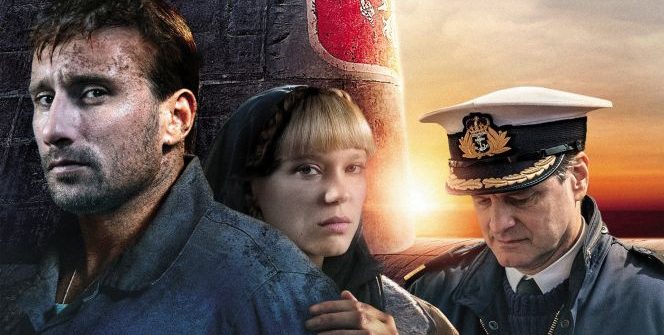MOVIE REVIEW – The tragic catastrophe of the Russian 2000 K-141 nuclear submarine in 2000, at the end of last year, also inspired a video game which unfortunately wasn’t as good expected. The deep-sea disaster that took place under the Putin government in 2000, not only tells the tale of the cruel catastrophe but also the way in which the Russian government pulled the action out of political interest, and instead of truly trying to save the twenty-three survivors underwater, they tried to cover everything and lie to their families.
Still, there was one thing missing from the movie: while the twenty-three Russian survivors fought for their life, Putin was shown as a calmly taking a picnic in his garden with the world’s greatest tranquillity. “As one of The Guardian’s experts remarked, “For Putin, the Kursk crisis was not just a human tragedy but a personal PR disaster. Twenty-four hours after the submarine disappeared, while the Russian Navy’s chiefs evaluated the modest chances of the 118 sailors, we could see Putin rolled up with his sleeve as he arranged a garden grill party in a Black Sea holiday home. ”
But what the film was trying to present, the fact that the Russian leadership, on the one hand, was incredibly stupid in the rescue, and they tried to silence all the information with the troubled and desperate family, like the real Soviet method which was customary before Gorbachev. Still, is the Kursk a good movie besides being that missing crucial element? Is this on par with the other submarine classic: Das Boot?
Commonplaces
The beginning of the film is a bit boring and commonplace: as it is shown in Das Boot, as the Russian sailors are preparing for their big trip, they are living with their families. The protagonist Mikhail (played by Putin’s remarkably resembling Matthias Schoenaerts) fools with his little child, while his wife is expecting another child and collecting money with Pavel (Matthias Schweighöfer) for the latter’s marriage.
The concept is not bad, as we have seen it in Das Boot, just the way it is done: the initial scenes are too long are uninteresting, and on the other hand, they are trying to show how the submarine’s crew are proud of their work and how much they love their family. Better artistic effects, shorter scenes could have made the effect that the viewer sympathizes with the sailors.
On the other hand, these initial scenes do not carry any other meaning, artistic message, which could have become really strong at the beginning of the film. There is a scene that is remarkably similar to Das Boot: the sailors are drinking, partying, but while the Wolfgang Petersen’ classic is cleverly showing the decadence that characterizes Hitler’s society, in Kursk we are missing a similar subtle, concealed meaning.
Explosive follow-up
After the weak start, the film gets a bit better in the second third of the movie. The actual disaster is presented by impressive scenes, thanks to the more artistic freedom, we can see as the sailors run away from the sight of their own dead comrades and the shocking catastrophe in the steel cavity of the exploding, sinking submarine.
Unfortunately, this momentum is rapidly dwindling, as the sailors squeezed in the back of the submarine are mostly condemned to inaction and the film is wasting too much time for this. There are, in fact, two scenes that change the pace a bit: one of the two sailors dives under the water after life-bearing oxygen capsules, risking their own lives, and the other is the one as one of them goes crazy and while waiting for the rescue.
What happens in Russia, stays in Russia
Interestingly, documentary scenes on land are much more exciting in the third, final part of the film. The surviving family is desperately trying to get answers from the Russian authorities, who are hesitant to take the steps of rescuing the twenty-three seamen still alive and making a political question of asking the British Navy to release them.
In this scene, it is worth highlighting the acting of Léa Seydoux, playing Mikhail’s wife, who defies the authorities desperately and who is increasingly determined against the wretched, stupid officials of the Russian Navy. It is a pity, though, that Putin was left out of his story, as I wrote in the introduction: he made a huge domestic and international scandal, as the Russian prime minister seemingly didn’t give a damn about the fate of his compatriots and the efforts to save them.
It remained at the bottom of the ocean
It is a bit regrettable that Thomas Vinterberg is lagging behind his earlier works and other submarine and political films, despite Kursk‘s extremely sympathetic message. Leaving out Putin from the story a great mistake, or the film lacks also some artistic flair. The direction of the actors could have been better as well: the wooden acting Colin Firth as David Russel’s English admiral is a wasted opportunity. All these negative factors, unfortunately, pull down the movie from the surface, where could it have been a triumphal success.
-BadSector-
Kursk
Directing - 6.8
Acting - 6.6
Story - 6.3
Visuals - 7.2
Ambiance - 7.2
6.8
FAIR
It is a bit regrettable that Thomas Vinterberg is lagging behind his earlier works and other submarine and political films, despite Kursk's extremely sympathetic message. Leaving out Putin from the story a great mistake, or the film lacks also some artistic flair. The direction of the actors could have been better as well: Colin Firth as David Russel's English admiral is a wasted opportunity. All these negative factors, unfortunately, pull down the movie from the surface, where could it have been a triumphal success.



















Leave a Reply